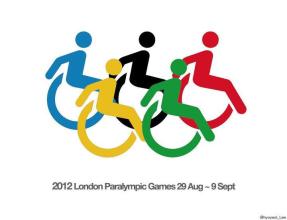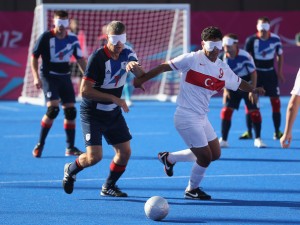When I think of a teacher, I imagine more than just a person giving a lecture in front of a class. I picture someone who, in addition to educating students, also acts as a coach, a mentor, a friend, and quasi-parental figure; someone who guides and influences young people on their quest to understand the world, the people around them, and how they fit into it all.
However, as a native English teacher–and a brand new one, at that–I’ve found it particulary difficult to reach students beyond the academic level. True, mentoring students is no easy task for any teacher. But especially when there’s an extreme language barrier, this task goes from difficult to near impossible. Every now and then I’ve spotted opportunities to have a meaningful discussion with a student or class, but usually neither of us can find the right words to take advantage of the occasion. Usually…
I’m proud to say, though, that today’s lesson was a different story!
 The topic was the Paralympics, the largest international competition in the world for high level athletes with physical disabilities. During the class, students completed a jigsaw reading activity to learn about the history, name, events and other facts of the Paralympics. A jigsaw reading activity requires each student to focus on one part of a reading passage. They read it thoroughly, and develop a good undersanding of the vocabulary and main ideas. Then, students form new groups comprised of members who have each focused on a different section. Everyone then teaches each other about their respective section. Although it was my first time incorporating this kind of activity into a lesson, it was a success! Students were challenged but not overwhelmed by the difficulty and volume of the content, and they were actively engaged the whole time.
The topic was the Paralympics, the largest international competition in the world for high level athletes with physical disabilities. During the class, students completed a jigsaw reading activity to learn about the history, name, events and other facts of the Paralympics. A jigsaw reading activity requires each student to focus on one part of a reading passage. They read it thoroughly, and develop a good undersanding of the vocabulary and main ideas. Then, students form new groups comprised of members who have each focused on a different section. Everyone then teaches each other about their respective section. Although it was my first time incorporating this kind of activity into a lesson, it was a success! Students were challenged but not overwhelmed by the difficulty and volume of the content, and they were actively engaged the whole time.
After the “English” portion of the lesson, we used the remaining class time to watch a few Paralympic athletes in action (earlier I had pulled YouTube clips for sports such as soccer, wheelchair basketball, archery, track and field, swimming, volleyball, alpine skiing and more). At this point, class had already been underway for a good 30 minutes. But once I hit “play” on the first YouTube clip, that’s when the real learning for the day started.
I watched as students’ eyes widened in amazement. I listened as utterances of admiration escaped their mouths. “How did he do that?” “How is that possible?” “Wow!” “Awesome!” “She’s so good!” The class was buzzing with positive comments; all in Korean, of course, but I could tell by a few words, their facial expressions and tones of voice that a change was happening. Stereotypes and preconceptions were dissolving and being replaced by new views and opinions. It seemed, and I had anticipated as much, that this was the first time they’d ever seen so many people with disabilities in one place, let alone playing sports–and playing well. Really well.
Though they couldn’t articulate it to me, nor I to them, I could sense they were getting the message: a person who has a disability is just as capable of doing anything as well as an able-bodied person, if not better. I only wish I could have clarified that it’s not amazing what they can do because they’re disabled; that they’re not “good…for being disabled.” It’s amazing what they can do because they’re good athletes. Period. Sure, their disability is a factor that alters how they swim, run, shoot, etc. But the real point is that if, for example, we only watched the amputees run in the Paralympics from the waist up, we would probably assume we were watching able-bodied Olympians instead.
 Soccer is hands-down the most popular sport among young people in Korea, so that clip was definitely the one that they enjoyed the most. Using a ball that produces sound so they can track it, blind athletes played with speed, agility, and skill reflective of world-famous pros like Messi and Ronaldo, who my students know so well. And the longer the kids watched the clip, the more their respect seemed to grow.
Soccer is hands-down the most popular sport among young people in Korea, so that clip was definitely the one that they enjoyed the most. Using a ball that produces sound so they can track it, blind athletes played with speed, agility, and skill reflective of world-famous pros like Messi and Ronaldo, who my students know so well. And the longer the kids watched the clip, the more their respect seemed to grow.
In the final moments before the bell rang, I wanted so badly to share a few thought-provoking quotes about disabilities with them. For example, “Being disabled doesn’t mean I’m handicapped or somehow ‘less than.’ It just means I do things a little differently.” Or, “I’m not disabled, I’m differently abled.” But I knew it would be too much for them. So instead I asked, “Can they play sports well? Are they great athletes? … Sports? Very good? Yes?” The class responded with a resounding “YES” and that was enough for me.
a few thought-provoking quotes about disabilities with them. For example, “Being disabled doesn’t mean I’m handicapped or somehow ‘less than.’ It just means I do things a little differently.” Or, “I’m not disabled, I’m differently abled.” But I knew it would be too much for them. So instead I asked, “Can they play sports well? Are they great athletes? … Sports? Very good? Yes?” The class responded with a resounding “YES” and that was enough for me.
Today my students expanded their vocabulary with words like “competition,” “athlete” and “disability.” But more importantly, they expanded their minds with notions like: “competition” is for everyone, “athletes” come in all shapes and sizes, and “disability” is not a synonym for “limitation” or “weakness.” And that’s something I’ll be proud of for a long time.
To view the original post and other great content, visit Korealizations at:
http://korealizations.wordpress.com
Like Korealizations on Facebook and subscribe on YouTube! Thanks for reading!


Recent comments